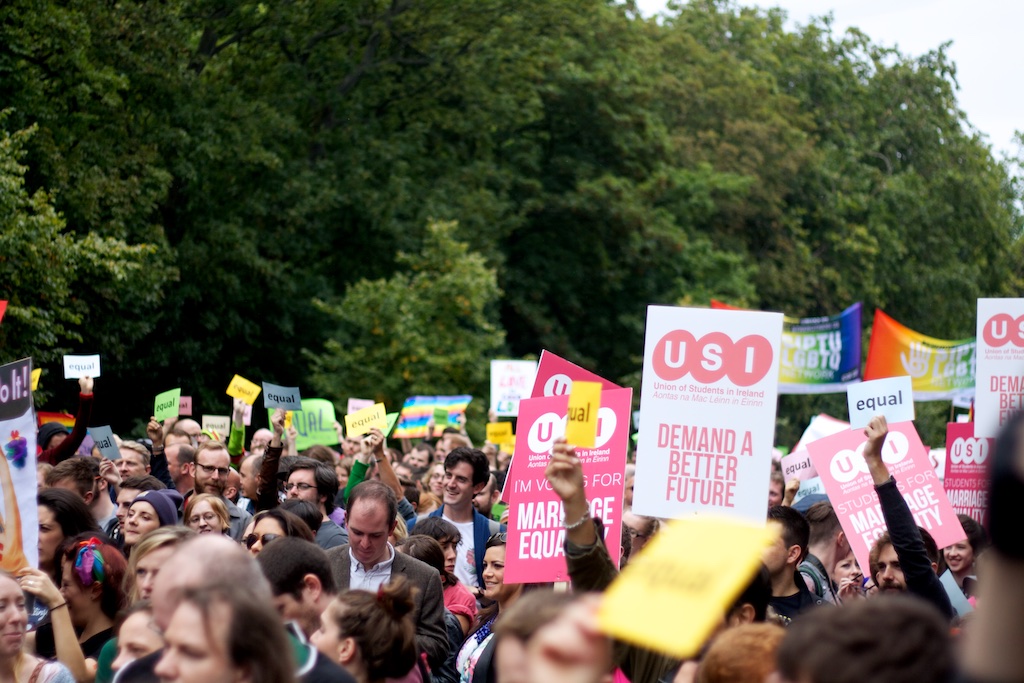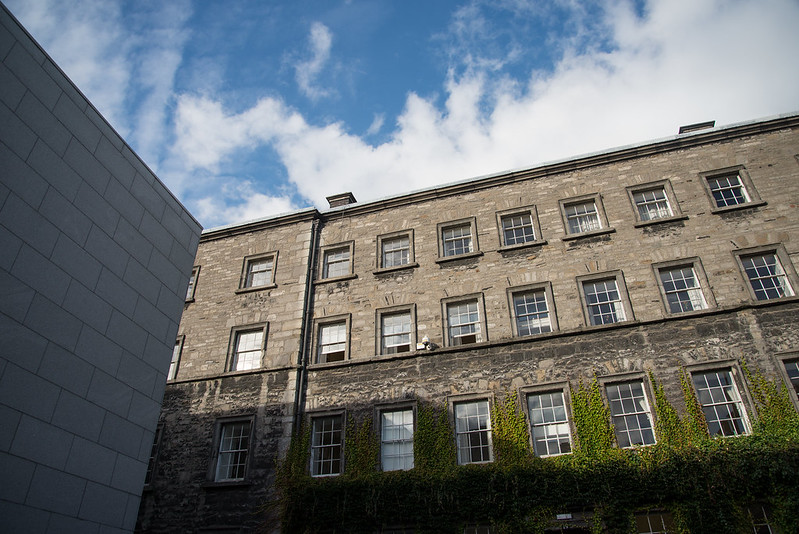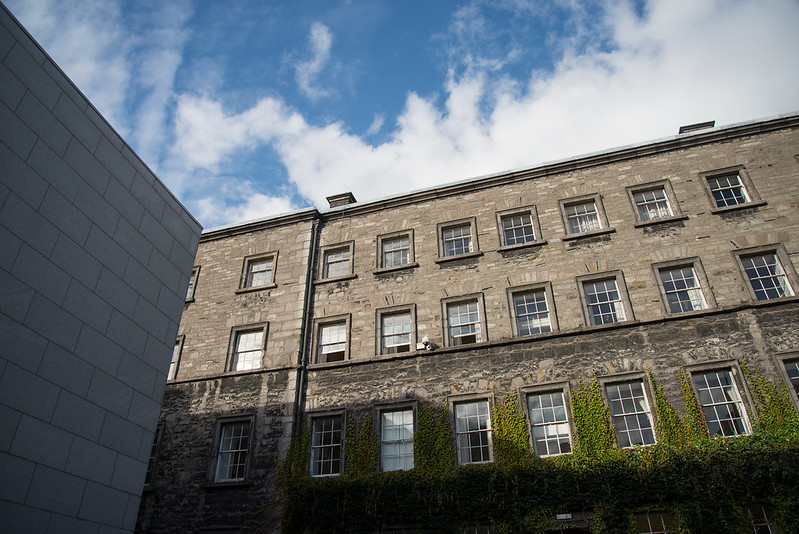In many ways, being a student is the best time to become engaged with politics and try to activate change. University serves as a hub for young people to discuss and flesh out their politics, still sectioned off slightly from the real world but with the ability to affect real changes for them and future generations, especially when standing together. But for many students, politics is not the priority, and the promotion of political campaigns by students’ unions can leave many feeling misrepresented.
A Trinity College Dublin Students’ Union (TCDSU)-issued survey of 400 students in 2015 ranked “political and social campaigns as the union’s most effective activity but among its least important”. It is interesting then that the current focus of TCDSU seems just as, or perhaps more, politically engaged than at the time of this survey. For one thing, at the end of that year, Lynn Ruane, one of the most influential political candidates for president anyone in Trinity can remember, was elected. Another more recent example comes as the union, earlier this month, hosted a Campaign Hub launch evening in which representatives from a range of campaigns spoke. To name a few: repeal the eight, Scholars at Risk, Fossil Free TCD and gender equality. While it was wonderful to hear the backgrounds of these diverse and well-run campaigns, afterwards, a couple of friends mentioned to me that they felt there was something slightly odd about the event. It was almost as if through the TCDSU’s backing of the campaigns, they felt a little enforced. If the union effectively serves as the representation of Trinity’s student body, there is arguably a certain a level of assumption there that your average Trinity student must back these campaigns.
The process for having a campaign brought into college is certainly a democratic one. Any registered student can put forth a campaign to TCDSU in a meeting of its council. The motion is voted upon by class representatives, who are themselves voted into their positions by their classmates, and the motion requires a majority vote to pass. Alternatively, any student can collect 500 signatures to call a referendum. This has resulted in interesting referendum campaigns over the past few years, from Seanad reform to water charges to direct provision.
While the process itself might be straightforward, the large number of people in the union alone serves to make it more complex
While the process itself might be straightforward, the large number of people in the union alone serves to make it more complex. Speaking to The University Times via email, Domnhall McGlacken-Byrne, who created the survey during his time as TCDSU president from 2014 to 2015, points out “the unusual construction of the SU – as a political organization of which people are automatically members”. This means that “it is surely very difficult to be a member of an organization, which has a stance diametrically opposing your own on an issue such as abortion, which is inextricable from a person’s deepest-held values”. While there is no change without aggression, we must be careful about towards whom the aggression is directed and that it not be towards students whose values disaccord with those of the union. That is a difficult position to be in, and one that all members of the union must consider rather than ignore.
McGlacken-Byrne presents the abortion debate as an example of “a non-student-specific issue on which the SU should nonetheless campaign – given our history on the issue, given the relevance of young people to the discourse and, most importantly, given our robust democratic mandate”. While many students are uneasy with the position of the union, with some even seeking ways to leave the union over this stance, others argue that this is an issue that was voted on and directly affects students, even more so than issues like marriage equality, which the union took a firm stance on to no vocal opposition. This kind of political discussion, however, can only be held when students feel they are being represented on the antithesis of “non-student-specific issues”: the “core issues”, those “of educational standards, equity of access and the quality of student life in Trinity”.
While emphasizing issues that intimately affect the student body should always be the focus of the union, sometimes the line is blurred between what makes an issue relevant to students. Speaking to The University Times, current TCDSU President, Kieran McNulty, discusses “a student issue in that it affects students” and in that vein, the campaigns of the union easily fit under that bracket, citing a “cohort of our student body that are really passionate about [the campaigns]”. It is the power and platform to affect change externally that comes with being in university that makes it so tempting to dedicate so much time to doing so.
McNulty discusses how he thinks it is “important considering Trinity’s history in campaigning for social change that we keep things going”. In this sense, Trinity and its students are part of a greater narrative. Here, a sense of responsibility to affect change is implied, but McNulty reminds us how important it is to be “careful” when approaching a “divisive issue”. McNulty also adds that “there’s not a huge amount of resources that go into these campaigns”.
Though emphasising issues that intimately affect the student body should always be the focus of the union, sometimes the lines are blurred
Speaking to The University Times, President of the Union of Students in Ireland (USI), Annie Hoey, explains how students are “not a homogenous group that just disappears behind closed walls for four years. We engage with the world outside of us. And [USI] engage in what our students want us to engage in”. While Hoey acknowledges that USI does not represent “one type of student that thinks one way”, she cites “clear mandates” as the “work that we have been elected to do”. Here, the work is clearly and rightfully directed towards change.
While it is certainly impractical to expect students to be unresponsive to the issues external to university, there is certainly a balance to strike. That students are not a “homogenous group” is also part of the reason that a union engaging in politics can be problematic. Although we stand at our most powerful in affecting change when we stand together, we do not all have the same opinions, and sometimes, I think this can be taken for granted.
It’s wonderful to bring forth a movement and affect change, but when this is done, we can often take liberties in the process in sweeping up the whole student body. There is definitely a place for political discussion in the union, particularly given that in many universities, including Trinity, societies cannot take political standpoints, but I think it shouldn’t be its primary focus. Politics are always exclusionary, and while this makes them no less worthwhile in a students’ union, it seems important to proceed in campaigns with caution, and remember that, in terms of politics, the union cannot represent all voices of the student body. It can attempt to represent the majority, but not all, and in this fact lies the discomfort with the system. Perhaps the union should not shy away from the political, but approach it with caution.








